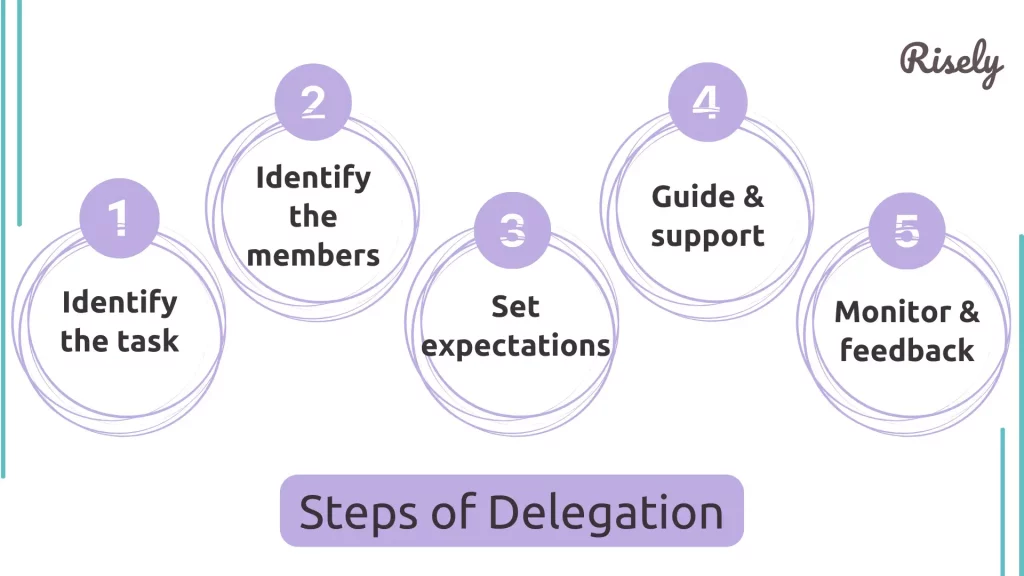5 Steps Of Delegation And The Most Common Mistakes
Delegation is a crucial skill for any leader or manager. It allows managers to accomplish more in less time and helps to develop their team members’ skills and abilities. However, delegation can be challenging, and managers must learn how to effectively delegate. In this blog, we will explore the steps of delegation and the advantages and disadvantages of delegation, and we have also outlined a few tips for effective delegation. By this blog’s end, you will better understand the 5 steps of delegation and how to effectively delegate.What is delegation?
Delegation is assigning responsibility for a task, project, or decision to another team member, typically someone lower in the organizational hierarchy. It involves transferring the authority to make decisions and take action, as well as the accountability for the results, to another person. In this way, delegation allows the delegator to focus on higher-level tasks and responsibilities while ensuring that significant work is still getting done. The main goal behind delegating is to free up your own time and save energy so that you can focus on more important or urgent tasks. It also enables other team members to develop their skills and abilities and can help to build a more engaged and motivated team. Finally, effective delegation also allows a team to get more done in less time and with less effort by distributing the workload and leveraging the strengths of different team members.What are the 5 steps of delegation?

Step 1: Task Evaluation and Prioritization
The first step of the delegation process starts with identifying what exactly you should delegate. If you are a manager handling ten initiatives, not all can be taken forward and delegated directly. Some tasks must remain with you, while others would occupy extra space and are better handled by your team. Finding this difference and prioritizing is key at this stage. When identifying which tasks to delegate, it is essential to consider the following factors:- The level of importance and urgency of the task
- The potential benefits and drawbacks of delegation
- Check the current workload and priorities of the team members before delegating the task
- The availability of resources and support for the team members will be delegated
🚩Delegation red flags you need to check for:
- You ignored the criticality of a task or underestimated its urgency
- The current workload and priorities of team members was not considered
- Necessary resources and support are available were not present
Step 2: Skilful Assignment to the Right Team Member
One of the steps of delegation involves selecting the team member with the necessary skills, qualifications, and expertise to complete the task successfully. When choosing the right team member for delegation, it is essential to consider the following factors:- The skills and qualifications of the team members
- Their level of expertise and experience in the specific task or field
- Their workload and availability
- Their willingness to take on the task
- The potential benefits and drawbacks of delegating to that team member
- Their potential for growth and development
🚩Delegation red flags you need to check for:
Read more: Top 7 Principles of Delegation that Managers Need
- Assigning tasks without considering the skills and qualifications of team members
- Assigning tasks to individuals who are unwilling or unenthusiastic
- Your team members do not see growth through the task
Step 3: Clear Communication and Expectation Setting
Effective delegation requires clear communication and well-defined expectations. When delegating a task, explaining the goal, the required outcome, and any specific instructions or guidelines is essential. Additionally, set clear deadlines and establish a system for tracking progress and providing feedback. When communicating the task, it is essential to:- Clearly explain the task and its objectives. Alongside, provide any relevant materials or resources needed to complete the task
- Establish a clear timeline and deadline for the completion of the task. Set clear and measurable goals for the task in tune with this timeline
- Create a plan for monitoring progress and addressing any issues that may arise during the course of the task
🚩 Delegation red flags you need to check for:
- Your team had unclear timelines and deadlines
- Your team did not understand the task, objectives, and expectations clearly
- Team members do not feel comfortable asking questions or raising concerns
Step 4: Empowering with Support and Resources
Delegating a task also means providing support and resources to ensure success. It includes everything from training and mentoring to providing access to tools and equipment. Additionally, provide ongoing support and feedback throughout the process to help your team members stay on track and make any necessary adjustments. While it is important for managers to provide support and guidance to their team members, but it is also important for you to avoid micromanaging and give team members the autonomy to take ownership of their tasks when the team members have the required skills. By avoiding micromanaging and giving team members the freedom to take decisions it will help build trust and confidence within the team, and allows team members to develop their skills and grow in their roles.
🚩 Delegation red flags you need to check for:
- The manager is heavily involved and micromanaging
- The manager is failing to provide necessary training and ongoing support
- Too many questions and permissions have created a stifling work environment
Step 5: Progress Monitoring and Feedback Loop
Monitoring progress and providing feedback is an essential parts of the delegation process. By keeping an eye on how the task progresses, you can identify any issues or challenges that may arise and provide guidance and support as needed. Additionally, make sure to provide regular feedback, both positive and constructive, to help your team members improve and grow. Similarly managers should regularly take feedback from team members. Managers can take feedback through 1-on-1 meetings. This can help managers understand the perspectives of their team members and identify areas for improvement in terms of team dynamics, project management, and individual performance. Additionally, regular feedback can also help team members feel heard and valued, which can lead to increased engagement and motivation.
🚩 Delegation red flags you need to check for:
These are not the only delegation problems that could bug you. With every mind, things can do different. But fret not! Check out: 8 Problems of Delegation that Hold You Back: How to Overcome Them?
- You are unable to monitor the progress of delegated tasks
- You provide feedback only during major milestones or neglect constructive feedback
- The work remains the same even after sharing feedback
How can you ensure an effective delegation process?
- Trust your team members: One of the essential aspects of delegation is trust. When managers trust their team members to take on responsibilities, they create an environment where they feel empowered to take ownership of their work and make decisions
- Communicate openly and honestly: Open and honest communication is vital to effective delegation. Set clear expectations and provide ongoing feedback to help your team members stay on track and make any necessary adjustments
- Be flexible: Delegation is not a one-size-fits-all process, and managers need to be flexible and adapt to the needs of their team members and the task at hand
- Recognize and reward success: When team members succeed, managers must recognize and reward their efforts. It can be in the form of bonuses, promotions, or even verbal recognition
- Learn from mistakes: Delegation can be a learning process, and learning from any errors or challenges is essential. By analyzing what went wrong, managers can identify areas for improvement and make changes to their delegation process moving forward.
- Keep seeking inspiration: Learn from examples of successful delegation to emulate best practices.
Other Interesting Reads
Conclusion
In conclusion, delegation is a crucial aspect of effective management and leadership. By following the steps of delegation outlined in the blog, managers will be able to build and lead a strong team and achieve their goals and objectives more. And learn how to effectively delegate.Grab a free effective delegation toolkit to know more about it
Get access to effective delegation strategies that successful managers use
Other Related Blogs
5 Frameworks to Master Prioritization Skills
Ever feel like your to-do list has morphed into a never-ending monster, overflowing with tasks and projects all vying for your attention? You’re not alone. As a manager, juggling priorities…
10 Successful Workplace Delegation Examples for Managers
Managers often find themselves stuck amidst huge workloads – delegation shows the way out! It can be effective when it involves a team member, and all are happy with the…
8 Problems of Delegation that Hold You Back: How to Overcome Them?
What is one of the most critical and challenging parts of the managerial role? I think every manager will agree that allocating and delegating tasks is the most challenging task,…
Mastering 5 Levels of Delegation: The Key to Managerial Success
Mastering 5 Levels of Delegation: The Key to Managerial Success Picture this: your to-do list is a monstrous beast, overflowing with tasks and threatening to topple you over. You know…


